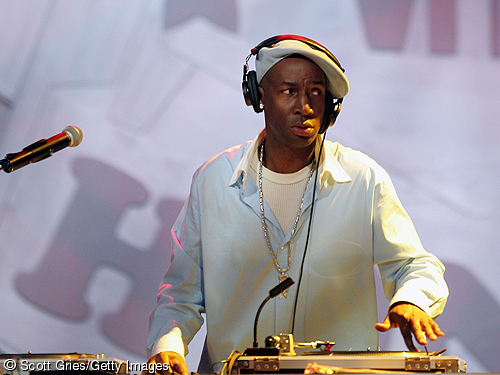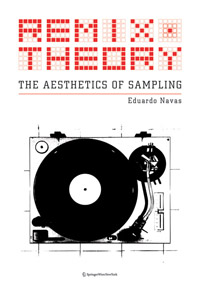Grandmaster Flash brings hip-hop to hall of fame, By Jeff Vrabel

Image source: http://www.stern.de/computer-technik/
computer/556287.html?eid=551201
Text source: Yahoo News
Mar 9, 2007
NEW YORK (Billboard) – You could spend the better part of a day listing the things Grandmaster Flash & the Furious Five did first: In the embryonic days of the New York rap scene, they were among its first superstars, they helped pioneer the freestyle battle and Grandmaster Flash was instrumental in inventing the art of break-beat DJ’ing.
Legend also has it rapper Mele Mel was the first to dub himself an “MC”; fellow rapper Cowboy is credited with coining the term “hip-hop.”
So it makes perfect sense to add another first to the list: On March 12, Grandmaster Flash & the Furious Five will become the first hip-hop act inducted into the Rock and Roll Hall of Fame. It was 25 years ago that their groundbreaking single “The Message” helped hip-hop kick down the door into a world of bigger audiences, and in their third year of eligibility, the act — comprising Grandmaster Flash, Kid Creole, Mele Mel, Scorpio, Raheim and the late Cowboy — will join a class that includes R.E.M., Van Halen, Patti Smith and the Ronettes.
And though the Hall of Fame has traditionally played around with the definition of “rock’n’roll” — just last year, Miles Davis became a member — it’s yet to embrace hip-hop. Part of that is strictly timing: Artists become eligible 25 years after their first recording, which, in the case of Flash & the Five, was 1979’s “Superrappin’.” But there’s a satisfying time element to the 25-year anniversary of “The Message,” the group’s seminal track, which, with its dark, ingratiating hook — “It’s like a jungle sometimes/It makes me wonder how I keep from going under” — sold half a million copies in a month and established hip-hop as a commercial and cultural force in the mainstream.
Billboard spoke with Grandmaster Flash and rapper Mele Mel on the eve of their induction.
BILLBOARD: HOW DID YOU HEAR ABOUT THE INDUCTION?
Mele Mel: I sleep with the TV on, so actually in my sleep I heard the woman reporting it. She announced Van Halen and R.E.M. while I was dreaming, and then I woke up to hear her saying, “Rap group Grandmaster Flash & the Furious Five also made the cut.”
Grandmaster Flash: There had been two false alarms on it, so when somebody called my house, I didn’t take it too serious, to be honest. But when they told me, I just looked at the phone, hung up and went on my merry way. The next morning I started getting a lot of calls, so I just said, “Note to self: This is it.” But it’s wonderful, wonderful, wonderful. Later than sooner still beats never!
BILLBOARD: WHAT DOES IT MEAN TO BE THE FIRST HIP-HOP ARTISTS INDUCTED?
Mele Mel: It validates all we put in as far as pioneering rap music and making it a global thing. We’re overlooked because we started so early in the game, before it got corporate and commercial, but being inducted makes people take a second look at who we are. People still know our music, but for some reason these young rap cats and the industry don’t really think we’re as important as we are. The Rock Hall solidifies it.
The main thing that the induction would do for the industry is force it to grow up. They’re trying to make it a little too juvenile, a lot too ghetto. Everybody understands the dope part of it, the violent part of it, so now let’s get back to the music part. This forces everybody to put a different face on hip-hop as a music-driven culture: It can be a teacher, a star of the community, instead of just an act on the corner.
Grandmaster Flash: So many of the other prestigious associations have embraced hip-hop, but this had been one that sort of hadn’t. And as a DJ, it’s pretty important. I go in with some of the greatest keyboard players, drummers, guitarists, bass players, horn players, and I go in with my instrument, which is the turntable. So although on one side it’s sort of a sore thumb, on the other I’m going in as a special situation. This isn’t just Flash & the Furious Five; this is hip-hop going in, the breakdancers, the MCs, the graffiti artists. So it’s cool. It’s kind of nifty.
BILLBOARD: DOES THIS LEND A VALIDATION OR ACCLAIM TO HIP-HOP MUSIC THAT IT MAYBE DIDN’T HAVE BEFORE?
Mele Mel: It does, but I’m not going to say it’s for “hip-hop music.” What we could call hip-hop and what it is now is not actually the same music. I think it validates the fact that pioneering groups, traditional groups are the most important ones, the ones that to this day can move hip-hop forward.
Today’s music is more stagnant — they’ve been doing the same thing, saying the same thing, for years. It’s not going anywhere. 50 Cent may be in the Rock and Roll Hall of Fame one day, but he won’t deserve it. All he did was just make records, and the records made money. He wasn’t as influential as Grandmaster Flash & the Furious Five or Run-D.M.C., or Kurtis Blow or Public Enemy. These are the influential groups in hip-hop. That’s the bigger movement and the bigger story about what hip-hop is.
Grandmaster Flash: Let’s just say that it’s the cherry to the validation. I can remember when you couldn’t see a hip-hop video anywhere, when other music organizations thought (hip-hop) was just a ship passing through the night. It makes me go back to my humble beginnings. As an inventor, sometimes you invent something and the people say, “No.” So thank God they said, “OK, maybe this could be something.”
BILLBOARD: WHAT LESSONS HAVE YOU LEARNED FROM YOUR YEARS IN MUSIC?
Mele Mel: That the business is the major part of it. We lost a lot of opportunities and chances because we weren’t as well-versed in the business side. We were just too busy being the creators and living the life of stars. It never got in the way of my talent, but it got in the way of moving forward as a group.
Grandmaster Flash: That I continue to love this. In some cases, I’m called an icon, but I look at myself as a servant. It’s allowed me to go from this little candy store that I made to a huge Wal-Mart-type of candy store, where I’ve got so much music to play and so many audiences to play in front of — whites, blacks, people overseas, audiences half my age. The lesson is that when you love what you do and you stick with it, it will take care of you. Hip-hop has taken care of me all my life.
BILLBOARD: WHAT ARE YOU WORKING ON NOW?
Mele Mel: “We’re doing promotion on (“Muscles,” his first solo record). (Wrestling’s) always had that hip-hop twist to it, and I’m a part of that.
Grandmaster Flash: I have an album deal I’m just about to close on. And I’m writing the story of my life, with the guy who wrote the Ray Charles biography, David Ritz. I’m really into these digital DJ applications, these sounds that used to be on the keyboard but are now on CDs. I’m a technology fiend.
Reuters/Billboard
Lascia un commento
You must be logged in to post a comment.








